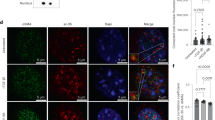Play all audios:

ABSTRACT Smooth muscle (sm) α-actin is expressed in vascular smooth muscle cells and fibroblast cells. Its expression is regulated by cell proliferation and repressed during oncogenic
transformation. In this study, we demonstrate that p53 activation is associated with a dramatic increase in organized microfilament bundles and an increase in sm α-actin mRNA level.
Wild-type p53, but not mutant p53, strongly stimulated human sm α-actin promoter activity in p53 null cell lines. The sequences homologous to the p53 consensus sequence and to the p53
binding sequence from the muscle creatine kinase, were found within a specific region of the sm α-actin promoter. This sequence was sufficient to confer p53-dependent activation to a
heterologous promoter and p53 was capable of binding to this sequence as assessed by gel shift analysis. Ionizing irradiation of colorectal tumor cells caused an increase in α-actin mRNA
level in a p53-dependent manner. Taken together, these results demonstrate that human sm α-actin gene is a transcriptional target for p53 tumor suppressor protein and represents the first
example of a cytoskeletal gene with a functionally defined p53 response element. Access through your institution Buy or subscribe This is a preview of subscription content, access via your
institution ACCESS OPTIONS Access through your institution Subscribe to this journal Receive 50 print issues and online access $259.00 per year only $5.18 per issue Learn more Buy this
article * Purchase on SpringerLink * Instant access to full article PDF Buy now Prices may be subject to local taxes which are calculated during checkout ADDITIONAL ACCESS OPTIONS: * Log in
* Learn about institutional subscriptions * Read our FAQs * Contact customer support SIMILAR CONTENT BEING VIEWED BY OTHERS NUCLEAR SMOOTH MUSCLE Α-ACTIN PARTICIPATES IN VASCULAR SMOOTH
MUSCLE CELL DIFFERENTIATION Article 28 September 2023 THE ORIGIN OF THE EXPRESSED RETROTRANSPOSED GENE _ACTBL2_ AND ITS INFLUENCE ON HUMAN MELANOMA CELLS’ MOTILITY AND FOCAL ADHESION
FORMATION Article Open access 08 February 2021 CALDESMON CONTROLS STRESS FIBER FORCE-BALANCE THROUGH DYNAMIC CROSS-LINKING OF MYOSIN II AND ACTIN-TROPOMYOSIN FILAMENTS Article Open access 13
October 2022 AUTHOR INFORMATION AUTHORS AND AFFILIATIONS * Department of Tumor Biology, Schering-Plough Research Institute, 2015, Galloping Hill Road, Kenilworth, 07033, New Jersey, USA
Katherine A Comer, Lydia Armstrong, Joseph J Catino & C Chandra Kumar * The Johns Hopkins Oncology Center, 720, Rutland Avenue, Baltimore, 21205, Maryland, USA Phillip A Dennis &
Michael B Kastan Authors * Katherine A Comer View author publications You can also search for this author inPubMed Google Scholar * Phillip A Dennis View author publications You can also
search for this author inPubMed Google Scholar * Lydia Armstrong View author publications You can also search for this author inPubMed Google Scholar * Joseph J Catino View author
publications You can also search for this author inPubMed Google Scholar * Michael B Kastan View author publications You can also search for this author inPubMed Google Scholar * C Chandra
Kumar View author publications You can also search for this author inPubMed Google Scholar RIGHTS AND PERMISSIONS Reprints and permissions ABOUT THIS ARTICLE CITE THIS ARTICLE Comer, K.,
Dennis, P., Armstrong, L. _et al._ Human smooth muscle α-actin gene is a transcriptional target of the p53 tumor suppressor protein. _Oncogene_ 16, 1299–1308 (1998).
https://doi.org/10.1038/sj.onc.1201645 Download citation * Received: 12 August 1997 * Revised: 10 October 1997 * Accepted: 10 October 1997 * Published: 19 March 1998 * Issue Date: 12 March
1998 * DOI: https://doi.org/10.1038/sj.onc.1201645 SHARE THIS ARTICLE Anyone you share the following link with will be able to read this content: Get shareable link Sorry, a shareable link
is not currently available for this article. Copy to clipboard Provided by the Springer Nature SharedIt content-sharing initiative KEYWORDS * α-actin * p53 * transactivation * cytoskeleton
